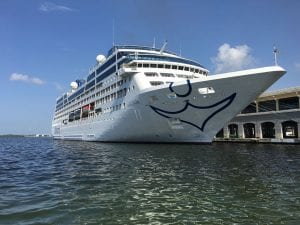Skift Take
Trump has been threatening to reverse Obama's engagement with Cuba for a while, and Tuesday's travel ban to the island certainly reinforces the view that he is the Anti-Tourism President.
The Trump administration placed sweeping restrictions on U.S. travel to Cuba Tuesday, closing off the island to nearly all U.S. travelers and potentially hurting industry players excited by renewed tourism to the island.
Cruise ships are no longer authorized to visit the island, cutting off one of the most popular methods of U.S. travel to the region. Of the 257,000 U.S. citizens who visited Cuba in the first four months of 2019, 142,000 came on cruise ships, according to Cuba government figures. The new restrictions also end authorization for group educational trips to Cuba, which are known as “people-to-people” travel.
“Today, the United States took strong action to prevent U.S. travel to Cuba from enriching the Cuban military, security, and intelligence services by announcing new restrictions on authorized travel and vessels to the island,” the announcement from the Department of State reads.“The United States will no longer permit visits to Cuba via passenger and recreational vessels, including cruise ships and yachts, and private and corporate aircraft,”
The move is the latest and the heaviest blow under the Trump administration to tourism in the region. It comes as part of a larger effort to reverse the opening up of U.S.-Cuba travel enacted by the Obama administration.
In 2016, the Obama administration made it possible for most U.S. citizens to visit Cuba, but in June 2017 the Trump administration ended that, only allowing visits to Cuba as part of educational group tours. Months later, the administration also banned U.S. travelers from staying at certain hotels on the island, which it said had ties to the Cuban government.
And in April, the administration announced upcoming restrictions on non-family travel to Cuba, and limited the amount of remittances Cuban-Americans can send to relatives.
“Restricting Americans’ freedom to travel is an attack on our fundamental right as citizens. The federal government should not be policing where Americans go on vacation,” said James Williams, president of Engage Cuba, a nonprofit lobbying group. “Today’s news is especially damaging for the Cuban people, particularly the burgeoning Cuban private sector, who rely on American travelers to support their businesses and families.”
Meanwhile, it is sure to impact the cruise industry. Cruise lines that have enjoyed the opening up of Cuba will have to reroute their ships.
“The most pressing, time-sensitive question is what it means for cruisers who already have their cruise to Cuba booked — is there any leeway for passengers who have already paid in full, and what does it mean for passengers who have yet to pay their final deposit?” said Erica Silverstein, senior editor at cruise review platform Cruise Critic.
“That said, cruise lines are able to swap itineraries relatively quickly. We see it often during inclement weather, or in the wake of disruption in particular regions. While we can’t say for sure just yet, if the lines are mandated to cancel sailings to Cuba, we’ll likely see itinerary adjustments.
“For cruises where a stop in Cuba is part of a wider Caribbean itinerary, it will be a matter of replacing just the Cuba calls with another port in the Caribbean. For Cuba-focused cruises, they’ll be forced to replace the itinerary entirely.”
The Daily Newsletter
Our daily coverage of the global travel industry. Written by editors and analysts from across Skift’s brands.
Have a confidential tip for Skift? Get in touch
Tags: cuba, u.s. government
Photo credit: Tourists take selfies with an iconic image of Cuba's revolutionary hero Ernesto "Che" Guevara in the background, at Revolution Square near the Ministry of Interior in Havana, Cuba, Sunday, Nov. 27, 2016. Desmond Boylan / Associated Press
